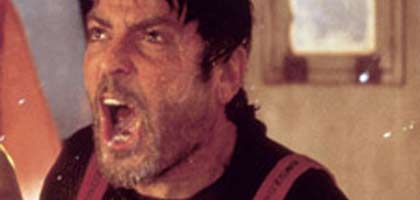Primary navigation

USA 2000

Reviewed by Andrew O'Hehir
Our synopses give away the plot in full, including surprise twists.
Gloucester, Massachusetts, October 1991. Billy Tyne, captain of the Andrea Gail, a swordfishing boat, returns to port with another disappointing catch. Although his crew want to stay home for a while, Billy decides to return to sea to fish the Grand Banks of the north Atlantic. One crewman quits and Billy recruits Sully, an old friend, to join Bobby, Murph, bachelor Bugsy and West Indian ladies' man Alfred Pierre. Fishing is poor on the Grand Banks and Billy heads east to the waters of the Flemish Cap. Murph and Sully fight. Murph is swept overboard in an accident and Sully saves him.
A massive storm brews; a hurricane and two hostile weather fronts collide along the Atlantic seaboard. A Coast Guard helicopter unit saves the crew of a foundering sailboat. When the helicopter crew tries to find the Andrea Gail, they run out of fuel and must ditch at sea. Its crew are rescued but one man is lost. Hoping to save the catch after the ice machine fails, Billy decides to drive through the storm back to Gloucester. Realising he can't make it, he attempts to return east. But a huge wave capsizes the Andrea Gail and all hands are lost.
A harrowing nautical adventure driven by dazzling special effects and fuelled by equal measures of human folly and heroism, The Perfect Storm seems made to order for some old-fashioned Hollywood yarn-spinning. It has the peculiar grandeur of a story whose ending we know before it starts; we watch fisherman Billy Tyne's (George Clooney) fatal mistakes as if through the eyes of God, or perhaps as Athenian audiences watched Oedipus Rex. Early box-office returns suggest that audiences have responded, silencing industry sceptics who doubted the public would flock to such a downbeat story. (Presumably, they forgot about the box-office splash made by Titanic and its similarly doomed passengers.)
But for all the commendable work of its cast and crew, The Perfect Storm is a great tragedy suffocated by tyrannical sentimentality. Sebastian Junger's non-fiction best-seller, on which the film is based, relies principally on ascertainable facts about the North Atlantic storm of 1991 and the fate of the Andrea Gail; it doesn't presume to speak for the dead. In contrast, Bill Wittliff's portentously awful screenplay flogs us, from its first lines, with a sense of maudlin predestination (underscored by the weeping and shuddering of James Horner's music).
Never a subtle film-maker, even at his best, director Wolfgang Petersen goes along with Wittliff's programme, from the early shot of the City Hall plaque memorialising Gloucester's lost seamen onwards. Gloucester is evidently the most doleful town on Earth, all foreboding dreams, divorced dads' wrenching goodbyes and worried women gazing at their doomed mariners and murmuring, "The Grand Banks are no joke in October," or, more directly, "Don't go, Bobby. I got a bad feeling." Then there's Billy's long, lyrical monologue about the route from Gloucester harbour out to sea, delivered to a rival captain and potential love interest: "You know what?" he concludes, "You're a goddamn swordboat captain. Is there anything better in the world?"
Seemingly continuing their on-screen relationship from Three Kings, Clooney, as Tyne, and Mark Wahlberg, as crewman Bobby, are once again exemplars of decent American guyness. Both are appealing and talented actors, and, along with the smashing storm cooked up by Petersen and his technical team, they very nearly make The Perfect Storm worthwhile. Clooney is, of course, the restless, twinkling rogue, while Wahlberg, like Russell Crowe in Gladiator, thinks only of the woman he left behind. This pattern suggests that Hollywood has rediscovered one of its grossest but most effective axioms: appeal to male audiences with heroes who love the woman they just met, and to female audiences with heroes who love the woman they already know.
There's a squishy, uncomfortable dishonesty to The Perfect Storm's discourse about class and money, and portraying Billy and Bobby as happy-go-lucky salts in worn flannels, grubby anoraks and three-day stubble does nothing to redeem it. Maybe the real Billy Tyne loved his job, but there are surely better things in the world than the choice he apparently faced: becoming either a broke swordboat captain or a dead one. In deciding to sail to the Flemish Cap and then to head directly into the storm, the Billy given us by Wittliff and Petersen briefly seems like an obsessive sea captain in the Ahab and Queeg tradition. But he is played by Clooney, Hollywood's reigning purveyor of sensitive masculinity, after all, and not even his disastrous greed and arrogance can shake the love of his men. In their last moments together on screen, Bobby tells Billy he has made the right decisions; the film-makers apparently do not intend this to be ludicrous. One almost hopes the real Bobby had time for something more along the lines of "Nice work, asshole."